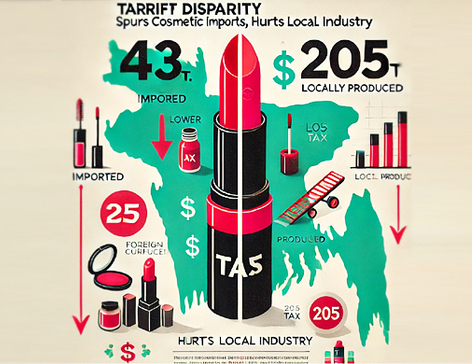
Imagine a stick of lipstick — a staple in many women’s daily lives. If it’s produced in Bangladesh, the manufacturer faces an uphill battle: Tk 205 in duties and taxes for a single 3.7-gram product. However, the same lipstick imported into the country incurs only Tk 43 in taxes. This stark contrast paints a grim picture for the local cosmetics industry, where tax burdens are stifling growth and deterring investment. The issue isn’t limited to lipstick. A range of products, including foundation, concealer, mascara, and blush, faces a similar imbalance. Local manufacturers must navigate a maze of supplementary duties and value-added taxes (VAT) that far exceed those applied to imported goods.
Breaking down the numbers
Analysing duty and tax data, the disparities are glaring:
Imported Lipstick: Supplementary duty Tk 2.90, VAT at the import stage Tk 1.40, and VAT at the supply stage Tk 38.60, total Tk 42.90 in taxes.
Locally Produced Lipstick: Supplementary duty Tk 77.19 and VAT at the supply stage Tk 127.37 combine to a total of Tk 204.56.
This fivefold difference is not just an inconvenience but a critical obstacle for the domestic cosmetics industry, which struggles to compete against imported products.
A struggling sector
Local entrepreneurs argue that these tax disparities are driving the country’s cosmetics market — valued at Tk 34,000 crore, according to a Bangladesh Trade and Tariff Commission (BTTC) study — to rely heavily on imports. While 70% of the country’s 27.3 million women aged 20-39 are estimated to use cosmetics, much of the demand is met by foreign brands.
Ali Zaman, president of the SME Owners Association, described Bangladesh as a “dumping ground” for foreign products, emphasising that domestic manufacturers face unfair competition due to tax policies.
The role of the NBR
Repeated attempts to reach the National Board of Revenue (NBR) for comment were largely unsuccessful. However, an anonymous senior official acknowledged the issue, stating that the BTTC had flagged these concerns. Unfortunately, the recommendations were not reflected in the latest 2024-25 budget.
The official hinted that the NBR is also investigating allegations of money laundering associated with undervaluation of cosmetics imports. By addressing this issue, the NBR hopes to level the playing field for local producers.
Counterfeit products: A growing threat
Another consequence of the current policy is the proliferation of counterfeit and substandard products. These items, often smuggled into the country, flood the market and pose serious health risks to consumers.
"Adulterated products cause skin problems and erode consumer trust," said Ashraful Ambia, president of the Association of Skin Care and Beauty Products Manufacturers and Exporters of Bangladesh. Without policy support for domestic production, these substandard goods dominate, jeopardising public health and trust in the industry.
Economic consequences
Economist Dr Muhammad Mahbub Ali highlighted another pressing concern “foreign currency outflow” due to reliance on imported cosmetics. Supporting local manufacturing could not only retain this wealth but also boost employment and strengthen the economy.
Similarly, former FBCCI director Ishaqul Hossain Sweet criticised the lack of government support for the cosmetics sector. "Other industries enjoy policy incentives, but cosmetics are left behind," he said.
A missed opportunity for growth
The BTTC has proposed reforms to address these challenges, including reducing supplementary duties and VAT for local manufacturers. However, these suggestions remain unimplemented, leaving the sector in limbo.
If nurtured, the domestic cosmetics industry could become a significant player in Bangladesh’s economy, offering import alternatives and generating employment. Entrepreneurs stress that leveling the tax playing field is critical to achieving this potential.
The cosmetics sector in Bangladesh is at a crossroads. With a thriving consumer base and a growing market, the industry has immense potential. Yet, tax disparities and lack of policy support threaten to stifle its growth.
Stakeholders call on policymakers to recognise the value of local manufacturers. By addressing these challenges, Bangladesh could unlock the true potential of its cosmetics industry, reducing import dependence, saving foreign currency, and offering consumers safer, higher-quality products, they said.

